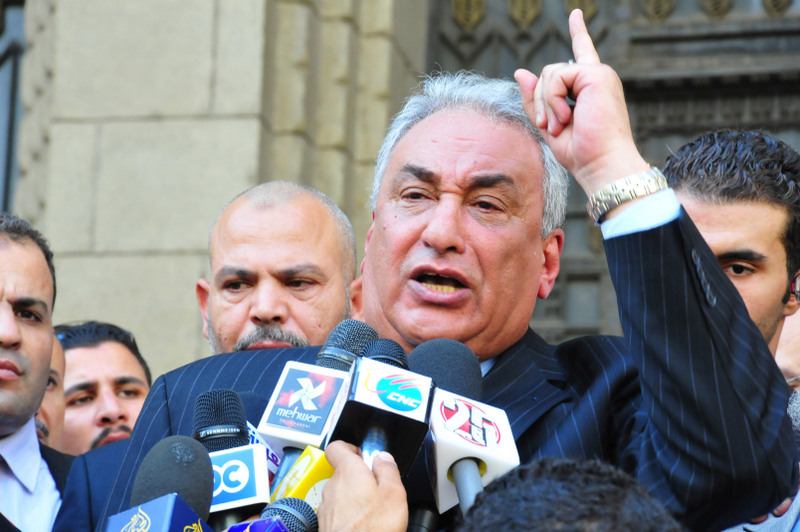
(DNE Photo)
The Cairo Criminal Court sentenced Tuesday former president Mohamed Morsi and five others to death on charges of participating in storming Egyptian prisons, attacking police facilities, and killing security personnel.
The court accused Morsi and the Muslim Brotherhood of collaborating with the Palestinian group Hamas, Lebanon’s Hezbollah, and a militant member of the Iranian Revolutionary Guard.
This is the first death sentence for the Islamist former president, who was ousted by the armed forces in July 2013.
He is expected to appear in the red uniform, which is often given to defendants on death row, in the upcoming ‘espionage with Qatar’ trial session.
Among the defendants who received death sentences are former parliamentary speaker Saad Al-Katatni and Freedom and Justice Party (FJP) Vice Chairman Essam El-Erian.
A total of 80 others, some of whom have Palestinian nationality, received death sentences in absentia.
Earlier on Tuesday in the espionage trial, the court cancelled the death sentence against Morsi, and ordered life sentences instead.
A total of 16 other defendants, including Muslim Brotherhood Supreme Guide Mohamed Badie, former Al-Katatni, received life sentence in the same case. This is the second death sentence for Badie.
In addition, leading Brotherhood members Khairat El-Shater, Mohamed Al-Beltagy, and Ahmed Abdel Aaty received death sentences, while another were sentenced to seven years.
The court also ratified the death sentence against 11 defendants in absentia. The court had previously referred the files of the defendants to the Grand Mufti for consultation.
The verdict received different reactions.
Former judge and head of the State Security Court, Amr Abdel Razik, said the verdict has removed legitimacy from former president Morsi, as well as condemned the Hamas movement.
Abdel Razik praised the judge’s explanation of how Islamic Sharia law punishes whoever causes the deaths of other people, before ratifying the death sentence.
Sondos Assem, one of the defendants who received a death sentence, said that she is disappointed but not “surprised”.
She added that the “Egyptian judicial system has been completely politicised”, banning hundreds who have been sentenced to death from “the basic protection of their right to a fair trial”.
The former member of the Freedom and Justice Party’s (FJP) foreign relations committee and editor of its official English language website continued: “The situation in Egypt continued to deteriorate and the lives of thousands who supported democracy after the January 25 revolution remain at risk.”
Sayed Ahmed, one of the defence team’s lawyers, said the defence will appeal the verdict in a matter of 60 days. Waleed Sharabi, spokesperson of the Judges for Egypt group, said that the court only the evidence by security forces, “while lacking any material evidence”.
A Muslim Brotherhood spokesperson said the verdicts support a political inclination, and show a desire to “eliminate the defendants”. It shows that the current system has a phobia of political Islam and the Hamas movement.
Brotherhood spokesperson Mohamed Montaser said Egypt’s current rulers are prosecuting the 25 January Revolution. He added that “very soon the revolution will prosecute them”.
After the verdict was issued, security forces were deployed in the streets in Cairo, Alexandria, and Luxor, state media reported. The Ministry of Interior said it does not comment on judicial decisions, and will continue to secure the Egyptian people and the public institutions.
In Giza’s Faisal neighbourhood, a public transportation bus was set on fire by unknown assailants.
In addition, the Egyptian Revolutionary Council, a pro-Morsi group of politicians stationed in Qatar and Turkey, condemned the verdicts describing them as “the execution of the finniest of Egypt’s sons”. The verdicts “will open a big door for evil that no one can close, till the coup is removed,” the group said, calling on Egyptian people to “revolt” against Al-Sisi.
The group, which lobbies in the US and Europe in favour of the ousted president, described the verdict as “political decisions”, which have become a “source of sarcasm for human rights organizations”.
Human rights lawyer Ahmed Mefreh said that all of the “procedures of the case didn’t exceed the limits of the Home Land security apparatus report which was presented to the court”,
“When the judge read out the report of the Mufti, it sounded similar to the security reports”, Mefreh added.
Before announcing the verdict, the presiding judge mentioned that the 30 June mass protests withdrew Morsi’s legitimacy, which made prosecuting him in front of a criminal court suitable.
Mefreh added another flaw in the verdict was that the judge was involved in other cases prosecuting the same defendants.


